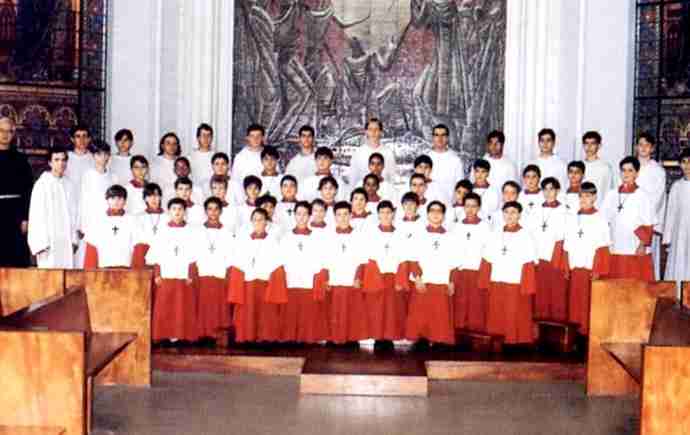
Figure 1.--The Coral dos Canarinhos from Petropolis is one of few boys choirs that we know of in Brazil. It was founded by a German priest in 1942. |

|
We have almost no information on Brazilian choirs. Brazil was a Portuguese colony and unfortunately we have no information on the boy choir traditin in Portugal either. A HBC reader notes two choirs: Coral dos Canarinhos from Petropolis and Rouxinois de Reine. Hopefully our Brazilian readers will provide us some information.
We have almost no information on Brazilian choirs. Presumably it was strongly influenced by Portuguese coral traditions. Brazil was a Portuguese colony and unfortunately we have no information on the boy choir traditin in Portugal either. Hopefully our Brazilian readers will provide us some information. It is notable that at least one of the choirs was formed by a priest with German musical training.
We are unsure how many boy choirs exist in Brazil. A HBC reader notes two choirs: Coral dos Canarinhos from Petropolis and Rouxinois de Reine.
The Coral dos Canarinhos wears eclesiastical red and white robes for their performances (figure 1). The Choir provides some information about itself.
"O Coral dos Meninos Cantores foi fundado a 15 de agosto de 1942 por Frei Leto Bienias, ofm. O frei, musicista de formação européia, nascido na cidade de Herne, Estado de Vestfália, na Alemanha, a 7 de abril de 1907, veio para oBrasil no ano de 1932, onde completou os estudos religiosos no Seminário do Rio Negro, no Paraná; passou pelo noviciado em Santa Catarina, cursou um ano de Filosofia em Rodeio, outro em Curitiba, terminando em Petrópolis, onde foi ordenado na Igreja do Sagrado Coração de Jesus a 26 de novembro de 1939. Com apurada formação musical trazida da Alemanha, ocupou-se com o Coral
dos Frades para, em seguida, criar o coral junto aos meninos da Escola
Gratuita São José, daí surgindo o Coral dos Meninos Cantores e que
recebeu a carinhosa denominação de "Canarinhos de Petrópolis". Frei
Leto conduziu o vitorioso Coral durante 30 anos, elevando-o à
excelência e ao respeito nacional, passando-o, no ano de 1973, à
batuta do maestro José Luiz Prim, brasileiro, nascido em
Florianópolis, Santa Catarina a 14 de junho de 1935 que respeitou e
ampliou com rara competência o trabalho de Frei Leto, mantendo e
regendo o Coro até recentemente, quando foi designado para outras
funções na Comunidade Franciscana Brasileira, assumindo a regência o
talentoso maestro Marco Aurélio Licht, com formação no Coro e sob
orientação de Frei José Luiz Prim."
This would translate as something like, "The Coral dos Meninos Cantores (Choir of Boy Singers) was established
August 15, 1942 by Frei (priest) Leto Bienias, amateur musician trained
in Europe. He was born in the city of Herne, Westphalia, Germany, on
April 7, 1907. He came to Brasil in 1932. He completed his religious
studies in the Seminario do Rio Negro ( Seminary of the Black River) in
Parana state. He did his apprenticeship in Santa Catarina. He took a 1
year course on philosophy in RODEIO, another one in Curitiba, finishing
in Petropolis, where he was appointed the pastor of the Church of the
Sacred Heart of Jesus on November 26, 1939. His German musical training
proved very useful. He occupied himself with the Choir of the Frades.
He next created a school for the boys at the Gratuitous School Are
Jose. The Coral dos Meninos Cantores grew from this beginning and
received the affectionate name "Canarinhos de Petropolis". Frei Leto
lead the choir for 30 years, raising it to a level of excellency and to
the national respect. A Brazilian teacher Jose Luiz Prim, became the
director in 1973. Prim was born in Florianopolis, Santa Catarina on
June 14, 1935. He extended the work of Frei Leto with rare ability,
overseeing and conducting the Choir until he was assigned to other
functions in Brazil by the Franciscan Order. Another Brazilian teacher,
MARCO Aurèlio Licht, who was once a chorister himself, became the
director."
We have no information about this Brazilian choir. We do, however, have an image, although it is undated. The boys wear open collar white shirts with what look like blue seeaters. Given thsat it is Brazil, they could be blue shirts wth white collars. The shirts have a shield on them identifying the choir. The shirts have destincive white waist detailing. The blue shirts are wrn with black long trousers. Hopefully our Brazilian readers will be able to tell us more about the choir.
Navigate the Historic Boys' Clothing Web Site:
[Introduction]
[Activities]
[Biographies]
[Chronology]
[Clothing styles]
[Countries]
[Bibliographies]
[Contributions]
[FAQs]
[Glossaries]
[Satellite sites]
[Tools]
[Boys' Clothing Home]
Navigate the Historic Boys' Clothing Web choir costume pages:
[Return to the Main choir page]
[Return to the Main national choir page]
[Australia]
[Austria]
[Belgium]
[]
[Bulgaria]
[Canada]
[China]
[Denmark]
[England]
[France]
[Finland]
[Germany]
[Japan]
[Netherlands]
[Poland]
[South Africa]
[United States]
Navigate the Historic Boys' Clothing Web style pages:
[Short pants suits]
[Blazers]
[Collars]
[Lace collars]
[Ruffled collars]
[Eton collar]
[Fauntleroy suits]
[Sailor suits]
[Ring bearer/page costumes]
[First Communion suits]
